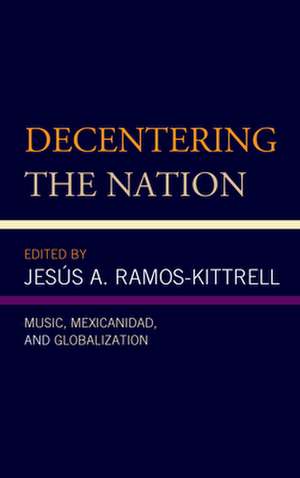Decentering the Nation: Music, Mexicanidad, and Globalization: Music, Culture, and Identity in Latin America
en Hardback – 11 dec 2019
Preț: 686.57 lei
Preț vechi: 891.65 lei
-23% Nou
Puncte Express: 1030
Preț estimativ în valută:
131.38€ • 140.49$ • 109.54£
131.38€ • 140.49$ • 109.54£
Carte tipărită la comandă
Livrare economică 18 aprilie-02 mai
Preluare comenzi: 021 569.72.76
Specificații
ISBN-13: 9781498573177
ISBN-10: 1498573177
Pagini: 292
Dimensiuni: 152 x 229 x 24 mm
Greutate: 0.54 kg
Editura: Rowman & Littlefield
Seria Music, Culture, and Identity in Latin America
ISBN-10: 1498573177
Pagini: 292
Dimensiuni: 152 x 229 x 24 mm
Greutate: 0.54 kg
Editura: Rowman & Littlefield
Seria Music, Culture, and Identity in Latin America
Notă biografică
Jesús A. Ramos-Kittrell is assistant professor in residence of ethnomusicology and music history at the University of Connecticut.
Cuprins
Foreword
by Chela Sandoval
Introduction: Post-Mexicanidad apropos of the Postnational
by Jesús A. Ramos-Kittrell
1.Afrodiasporic Visual and Sonic Assemblages: Racialized Anxieties and the Disruption of Mexicanidad in Cine de Rumberas
by Laura G. Gutiérrez
2.The Danza de Inditas in the Mexican Huasteca Region: Decolonizig Nationalist Discourse by Lizette Alegre González
3.Chaveläs Frida: Decolonial Performativity of the Queer Llorona
by Ana R. Alonso-Minutti
4.Vaquero World: Queer Mexicanidad, Trans Performance, and the Undoing of Nation
by Nadine Hubbs
5.¿Soy gallo de Sinaloa jugado en varios palenques¿: Production and Consumption of Narco-music in a Transnational World
by César Burgos Dávila and Helena Simonett
6.Yo lo digo sin tristezas (I say it without lament): Transnational Migration, Postnational Voicings, and the Aural Politics of Nation by Alex E. Chávez
7.Reclaiming `the Border¿ in Texas-Mexican Conjunto Heritage and Cultural Memory
by Cathy Ragland
8.Sounding Cumbia: Past and Present in a Globalized Mexican Periphery
by Jesús A. Ramos-Kittrell
9.Southern California Chicanx Music and Culture: Affective Strategies within a Browning Temporal System of Global Contradictions
by Peter J. García
10.Listening from `The Other Side¿: Music, Border Studies and The Limits of Identity Politics
by Alejandro L. Madrid
Descriere
This book considers how global capitalism has upset the symbolic economy of "Mexican" cultural discourse. It focuses on the cultural processes through which people contest ideas about race, gender, and sexuality; reframe ideas of memory, history, and belonging; and negotiate the experiences of dislocation that affect them.












